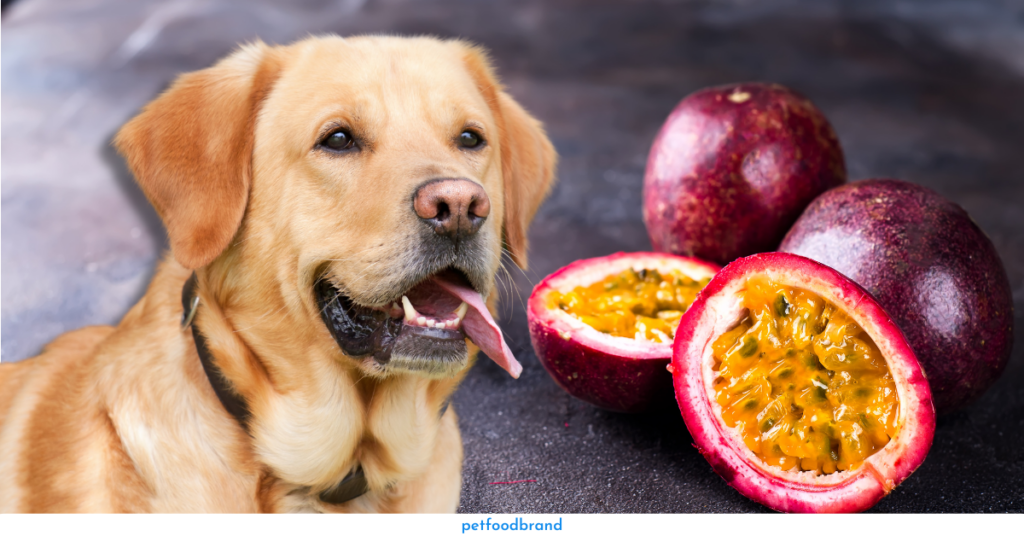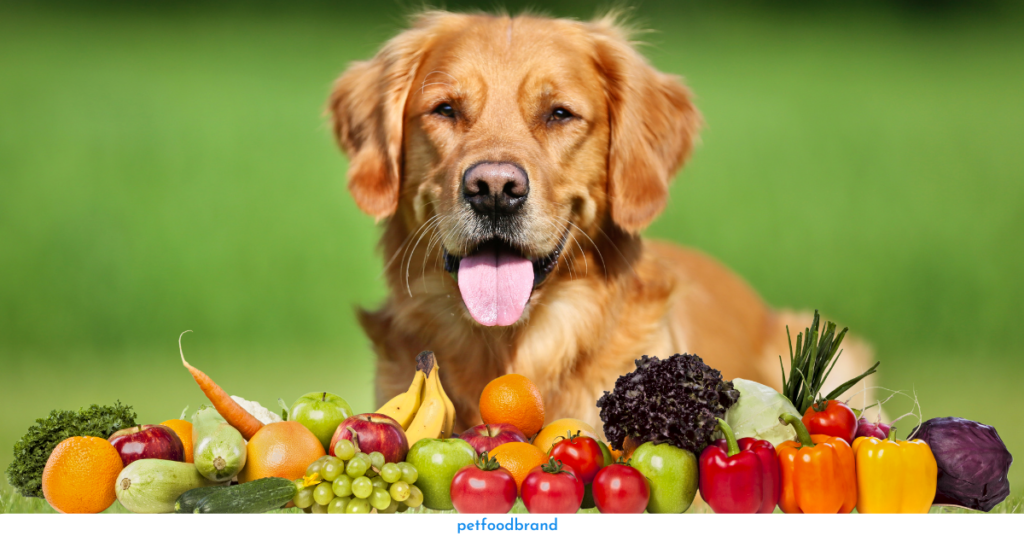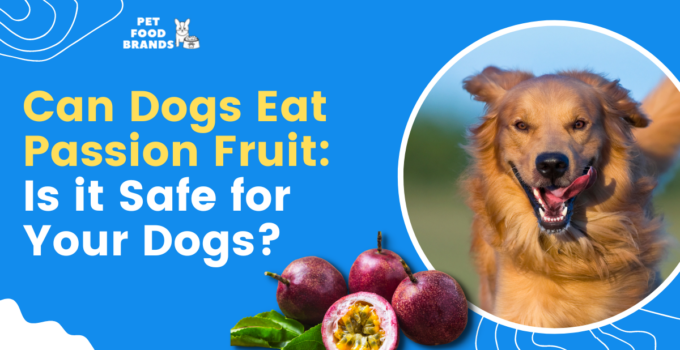Who doesn’t like eating delicious, juicy, and ripe fruits? And I believe everyone should enjoy it because fruits are not only tasty and refreshing but also abundant in essential nutrients that could boost overall health.
If you have a pet dog, I’m sure you would have thought about sharing the delicious experience of eating fruits with your furry friend. While your dog can eat and benefit from a lot of fruits, not all are safe, like passion fruit.
If you’re thinking about giving passion fruit to your pup, you must not, as it is toxic for canines.
Dive right in to learn more about this fruit, what makes it harmful for your dog, and steps you should take in case of accidental consumption!
Can a Dog Consume Passion Fruit?

No, your pet dog cannot consume passion fruit as it is toxic for a canine. As you might already know, passion fruit consists of flesh, rind, and seeds. While all of them are harmful to your pooch, seeds are the most concerning parts. Wondering why? It’s because the seed content is dense, much like apples, and contains cyanide.
However, if you think removing seeds from passion fruit is simple, let me burst your bubble. It won’t be as easy as you imagine. If you want to understand why passion fruit is poisonous to your pup, you must first understand the anatomy of this fruit. Let’s begin!
1. Ripe Vs. Unripe
The first thing you can do to decide whether passion fruit is toxic for your furry friend is to check if it’s ripe or not. It might sound confusing, but if the passion fruit is unripe, it is toxic; however, the ripe flesh is not.
2. Seeds
The seeds of passion fruit are small black ones that are speckled throughout. While the tiny seeds may look harmless, they contain cyanide and are hazardous for canines.
3. Flesh
The next part of the passion fruit is the flesh, which, unlike other parts, is not harmful to your pet dog. But the catch here is that the entire fruit’s flesh is brimming with little seeds, and you cannot remove all of them.
You might be wondering whether you can juice the passion fruit and offer it instead, but you should try to avoid that as well because the process might blend a few seeds and create a toxic mixture.
4. Rind
The rind is also harmful to canines. Although it is easy to remove, I still think it’s best to avoid giving it as it may be stuck to the flesh of the passion fruit.
As a pet parent, you might get tempted to share the delicious fruits you are enjoying with your furry buddy, but it might not always be safe. There are parts of the passion fruit that are safe for canine consumption; however, there’s always a risk of contact with other toxic parts, and you must keep it away from your pooch!
What are the Risks for Dogs From Eating Passion Fruit?

You might have grown up reading or hearing about the numerous health benefits offered by passion fruit. And it’s true; this fruit is brimming with antioxidants and essential nutrients like vitamin A, vitamin C, potassium, and magnesium, all making it a super healthy and palatable food for you.
Then how is passion fruit harmful for dogs? Well, here are a few reasons that contribute to making it unsafe for your pup:
1. Allergic Reactions
The most common health complication associated with passion fruit is allergy. Your dog could be allergic to the fruit and develop symptoms like difficulty breathing, swelling, and even gastrointestinal issues.
2. Choking
Another risk that comes with passion fruit is choking, and both rind and seeds can cause that. Moreover, it can be tough to separate the different parts of passion fruit and cut them into tiny bits. If your pooch consumes large chunks of it, this could lead to a blockage in the upper digestive tract.
3. Cyanide Poisoning
While an unripe passion fruit can contain a lot of toxic content like cyanogenic glycosides, ripe ones have cyanide in the seeds. If consumed by your pup, it could lead to cyanide poisoning and cause severe health issues such as diarrhea and vomiting.
My Dog Consumed Passion Fruit: What Should I Do?

If you notice your pup stealing a few pieces of passion fruit from the kitchen counter, I’m sure it’s enough to scare you. Well, in this situation, you must remain calm and look out for the following signs in your pet:
- Drooling
- Diarrhea
- Rapid breathing
- Muscle spasms
- Increased heartbeat
- Gums turning red or blue
- Watery eyes
- Vomiting
There is a high chance that your pup ingested the seeds while eating passion fruit, and it poses the risk of cyanide poisoning. It can be incredibly dangerous for your pup, and you might notice the signs appearing within 15-20 minutes of consumption.
If you think your dog consumed a large portion, it might cause convulsions and even death within 40-45 minutes of ingestion. In case your pup has consumed passion fruit, you must not wait for the severe symptoms to appear and go to a veterinarian immediately.
Fruits that are Safe for Your Dog

Just because passion fruit is not safe for canines doesn’t mean that your dog cannot enjoy others. There are a few fruits that you can share as they are completely safe for canines.
However, you must remember that fruits with high sugar levels must be given only as an occasional treat, and it’s best to run them past a vet before incorporating them into your dog’s daily diet. Here are some fruits that are safe for dogs:
- Apples
- Cranberries
- Blueberries
- Bananas
- Oranges
- Mangos
- Pears
- Peaches
- Pineapple
- Strawberries
- Watermelons
You can de-seed these fruits and even remove the rind and flesh and cut them into bite-size pieces that are easy to eat for your pup. This should also eliminate the risks of choking.
Frequently Asked Questions
Can Dogs Eat Mango And Passion Fruit Yogurt?
No, it is unsafe to give yogurt containing passion fruit and mango to dogs.
Can I Give My Dog Papaya?
Yes, you can give papaya to your pup, but only in moderation. The fruit comes with a good amount of fiber as well as essential nutrients.
Is It Okay To Give Pomegranate To Dogs?
Pomegranate is not unhealthy or toxic to dogs; however, this fruit can still cause gut issues.
Final Thoughts
The passion fruit is truly a delicious tropical fruit, and it offers a variety of health benefits. So, if you love your pet, you would definitely want them to have all the benefits from the fruit.
But after this detailed discussion on passion fruit, I am sure that now you have realized that this fruit is harmful to canines. The toxic cyanide present in passion fruit will not only impact the digestive health of your beloved pet but will also have a huge toll on their overall health. In severe cases, it may even be fatal for your pup.
So never, I repeat, never feed your dog the passion fruit. If they have managed to eat it accidentally, immediately consult a vet and take your pup to them for emergency treatment.
Your pup is precious to you, so there is no harm in being extra cautious. It will ensure that your beloved furry friend stays happy and healthy.

Ankita is a passionate pet lover and head of content at Pet Food Brands. With her extensive knowledge and research, she provides pet owners with top-quality information on dog food and nutrition. Her dedication to improving the lives of dogs makes her a leading voice in the industry.




